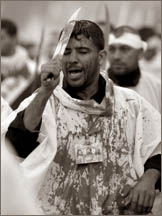|
observer |
|
|
|
|
|
OTHER LINKS |

|

|

|
Bush's three-front blunderUS President George W Bush's State of the Union address appears to confirm other indications in recent weeks that he is not merely sending more troops to Iraq to do more of the same, but has adopted a new strategy of fighting all three major Iraqi Arab political-military forces simultaneously.
Bush hinted strongly that he has decided to make Muqtada al-Sadr's Mehdi Army a major military target of the increased US troop presence in Baghdad, while continuing to wage war against both al-Qaeda and its Sunni extremist allies, on one hand, and the non-jihadi Sunni resistance, on the other. Two weeks before the January 23 State of the Union speech, Lieutenant-General Raymond Odierno, the No 2 US commander in Iraq, told reporters he wanted to use most of the additional 21,500 troops to launch a new military push against both Sunni and Shi'ite militias in Baghdad. The new policy appears to have been prompted by both the need to demonstrate to the US public that the administration is doing something different and to use force against a presumed ally of Iran in the region. But it means that the United States is now planning to fight what is in essence a three-front war without any reliable Iraqi Arab ally. Only the Kurds can be counted on to cooperate with the US military in such a war, because of their reliance on US support for their aspirations for quasi-independence. Bush referred indirectly to the administration's new readiness to take on the Mehdi Army when he insisted that Iraqi leaders now have to "lift needless restrictions on Iraqi and coalition forces, so these troops can achieve their mission of bringing security to all of the people of Baghdad". That was a reference to an agreement that Prime Minister Nuri al-Maliki's government reached with Muqtada's organization last year that prohibited US troops from going into Sadr City, the Baghdad base of Muqtada's political-military organization. One veteran military expert on Iraq, retired US Army Colonel Douglas Macgregor, said Bush's new policy is a "war against all" in Iraq and called it "a blunder of Hitlerian proportions". Macgregor likened the policy of fighting all three Iraqi anti-occupation forces at once to Adolf Hitler's insistence on continuing a two-front war against the Soviet Union and the Allied powers during World War II, which is widely regarded as having ensured the defeat of Nazi Germany. US forces defeated the Mehdi Army of 2,000 men in Najaf in August 2004. Since then, however, Muqtada has emerged as the most popular and powerful figure in Baghdad and the Shi'ite south, muscling aside the previously dominant Badr Organization. The Mehdi Army is now believed to be many times as large as it was in 2004, and it has significant support within the Iraqi security forces. US officers in Baghdad were telling reporters last September that they opposed doing battle with the Shi'ite militia. Colonel Joseph DiSalvo, commander of the 3rd Infantry Division in eastern Baghdad, told Tom Lasseter of McClatchy News Service in December that it would be all but impossible for the US military to defeat the Mehdi Army. "You'd have to have more manpower than is feasible," said DiSalvo. In the weeks before the speech, Maliki was reported to have resisted targeting Shi'ite sectarian militias in Baghdad and to have opposed bringing US troops into central Baghdad. He was said to have proposed last November that Shi'ite forces take care of security within the city, while US troops patrol the perimeter. A little over a week before the State of the Union address, New York Times reporter John Burns quoted an unnamed US military official who had been involved in negotiations with the Iraqi government over security operations as saying, "We are implementing a strategy to embolden a government that is actually part of the problem. We are being played like a pawn." Also missing from Bush's speech was the US administration's past claim that the Iraqi army stands above sectarian interests. That sectarian Shi'ite character of key army units in the Baghdad area has been increasingly revealed in recent press reports. |










